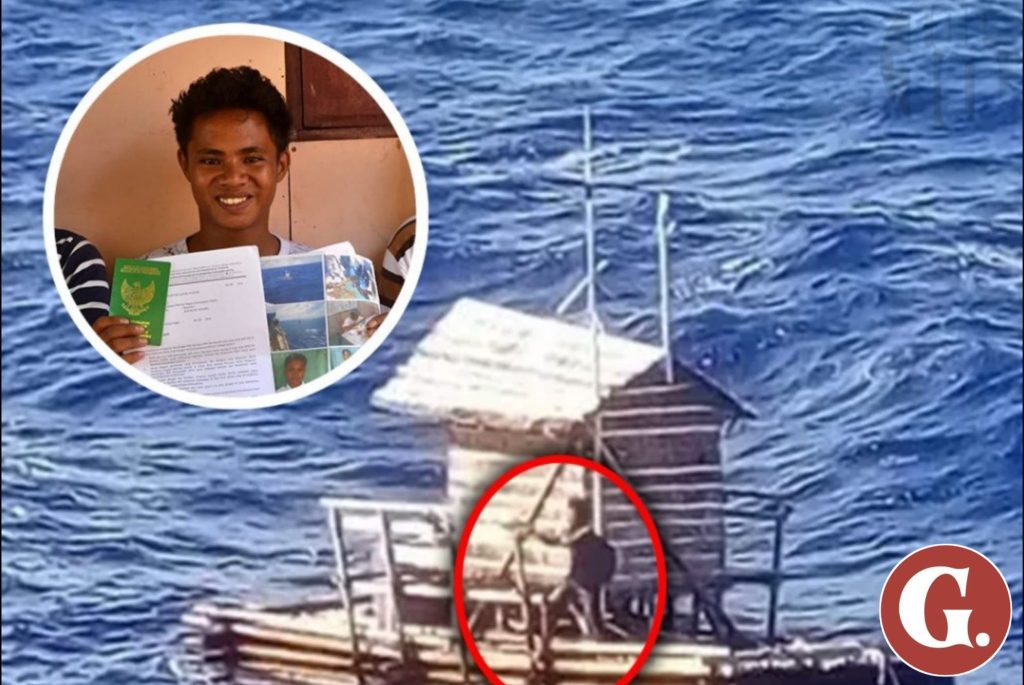Indonesian Teen Drifts 1,200 Miles for 49 Days on a Tiny Raft—Fishing, Prayer and Hope Keep Him Alive
When 18‑year‑old Aldi Novel Adilang stepped aboard the fishing raft known locally as a “rompong,” he probably thought it would be another routine trip maintaining lamps to attract fish. But on 14 July 2018, strong winds and high seas snapped the rope anchoring his floating hut off the coast of North Sulawesi, Indonesia—sending him adrift in the vast Pacific Ocean with no paddle, no motor, and just a week’s worth of supplies. That moment marked the beginning of an extraordinary journey of survival, faith, and resilience that would last 49 harrowing days and carry him 1,200 miles away before rescue.
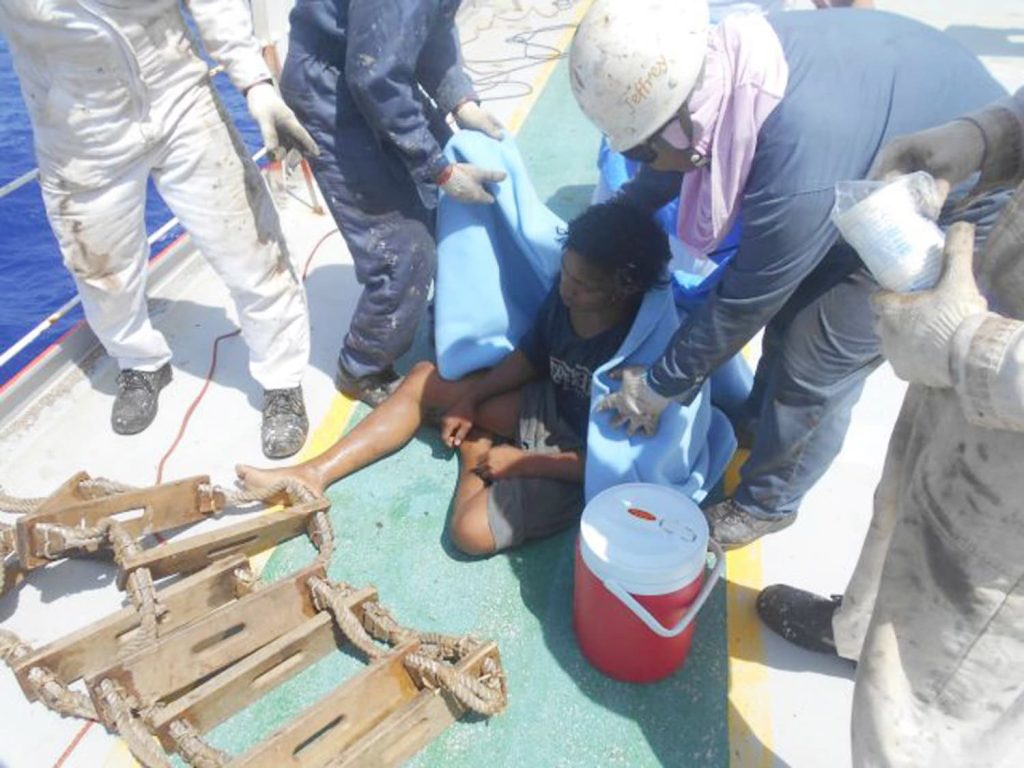
At first, Aldi stayed calm. He went about his daily routine as best as he could—lighting the lamps, hoping someone would return. But very soon, the truth sank in: he was completely alone. His rice, coconuts and water began to run low. Without fresh water or fuel for cooking, he improvised. He fished for his meals, grilling or boiling them when he could. When the cooking gas ran out, he burned wooden fencing from the rompong to light a fire. When fresh water evaporated, he dampened his clothes with seawater and managed to sip that through fabric to reduce the salt—a desperate measure that carried immense risk to his health. Yet, it kept him alive. These improvisations are documented and verified by multiple news reports: Teen Vogue and NBC News detailed how he caught fish and survived by drinking filtered seawater and scavenging wood from the raft to cook.
The emotional weight of those days was immense. Aldi admitted to often crying, grappling with waves of fear and loneliness. More than ten ships passed by him without noticing—even passing within sight—but none stopped to help. Each sighting renewed hope, only to crush it again when nothing happened. He once considered ending his life by jumping into the ocean, but at that low point, he remembered his parents’ advice: pray, and turn to God. He began reading the Bible he carried with him—focusing on books like Matthew, John, Isaiah, Genesis and Psalms. He sang Christian songs to keep despair at bay. That spiritual practice became his anchor amidst the endless blue horizon.
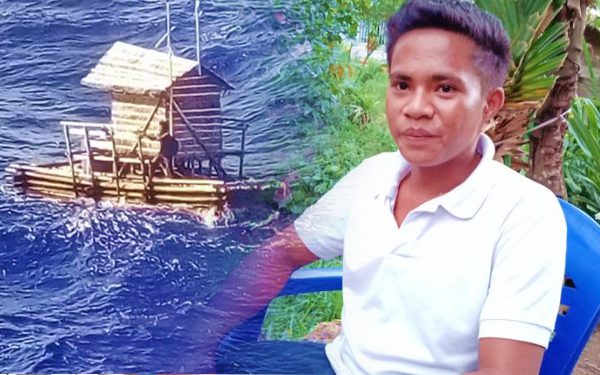
Day turned into week, week into month. He marked the passing days in his notebook so as not to lose track. All around him, the sea ruled in isolation. A shark circled his raft for a day. Hunger gnawed at him, thirst grew persistent, and fear shadowed every sunrise. But he endured, caught fish daily, prayed each afternoon, and clung to hope that rescue would come. When he finally spotted the tanker MV Arpeggio on 31 August near Guam, he lit the lamp and turned on his radio to broadcast a distress signal. At first, the massive vessel couldn’t get close without risking capsizing the small raft. So Aldi made another leap of faith—literally. He jumped into the sea and grabbed the ship’s rope ladder. The crew hauled him aboard, wrapped him in blankets, and fed him for the first time in weeks. Equally careful handling and compassion followed as the ship headed toward Japan before handing him over to Indonesian consular officials and, ultimately, reuniting him with his family back in Manado, North Sulawesi.
Recovery wasn’t instant, but he arrived home alive. The ordeal prompted calls back in Indonesia for improved safety measures for small fishermen—nonfunctional radios, no GPS, and no paddle or steering tools are common among these remote floating fish huts. Advocates urged for walkie-talkies and GPS systems to avoid such tragedies in the future. Aldi’s courage became not just a personal testament, but an emblem of resilience in communities that rely on the sea and face hidden dangers daily.

Survival Through Faith, Resourcefulness and Hope
Aldi’s story has all the elements of a survival epic: isolation, resource scarcity, physical danger, mental exhaustion, and looming hopelessness. But what stands out most is the role his faith played in keeping him alive. He didn’t just pray out of comfort—he read scripture daily, sung songs of worship, and used the rhythms of his faith to turn despair into endurance. His ability to remain calm enough to ration food, repair parts of the raft, fish, mark days, and keep trying radio signals shows a discipline rooted in both spiritual belief and survival instinct. His words, shared through interviews and news accounts, reflect the truth of his ordeal: “Every time he saw a large ship… he was hopeful, but more than 10 ships passed him… none of them stopped”.
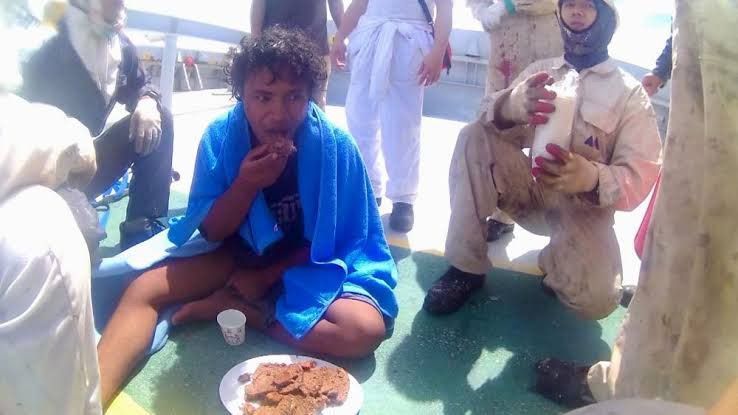
Living without fresh water for days, relying on filtered seawater, burning wood to cook fish, staying motionless for countless hours without succumbing to panic—each detail of his story underscores both the physical brutality of survival and the inner well of resolve he possessed. And when rescue finally arrived, many who heard his story couldn’t comprehend how a teenager—and one who initially couldn’t even swim—managed to survive such odds.
When people across social media and news platforms responded, it wasn’t just admiration for his physical survival, but gratitude for the example he set. Aldi’s ordeal became a touchstone for religious communities, survival enthusiasts, and advocates for fishermen’s wellbeing alike. Messages poured in celebrating his courage, sharing encouragement for families of missing mariners, and renewing conversation around expanding safety tools for remote workers at sea.
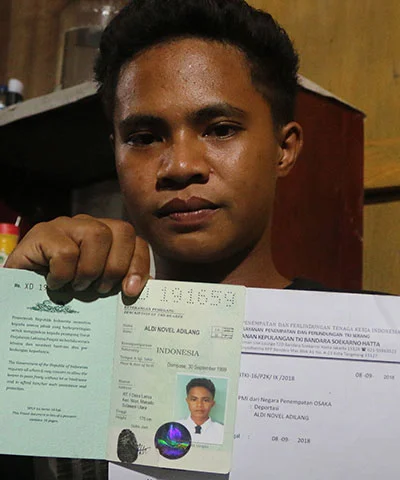
Today, people remember Aldi not for superstition or exaggeration, but for tangible proof of human resilience. His journey across 1,200 miles of the Pacific Ocean, armed with only faith, a Bible, creativity, and basic survival skills, challenges us to reflect on hope in conditions of zero control. It’s a reminder that despair doesn’t always win. That prayer, purpose, and perseverance—together—can outlast fear.
He may have returned physically fragile, but spiritually, Aldi Novel Adilang emerged stronger. And though he’s not working on the sea anymore, his story lives on: shared in interviews, sermons, media features, and conversations about faith and meaning under duress. Sometimes survival isn’t just about reaching land—it’s about refusing to surrender to the sea inside you.
When I think of Aldi’s journey now, I imagine that first night after the rope snapped. He stared into endless dark water, lamps flickering around him, separated from home by thousands of waves. And yet, instead of giving in, he chose to light fish-trap lamps, open the Bible, sing, fish, pray. That decision—to believe he would reach land again—shaped everything that followed. It’s a lesson in how small acts of faith can carry us past the impossible.
